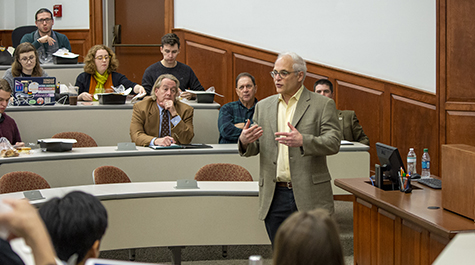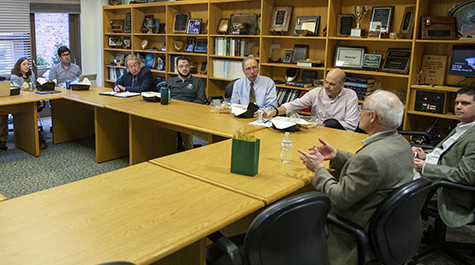William & Mary Law School Welcomes Professor James Q. Whitman for Marshall-Wythe Lecture in Legal History
William & Mary Law School hosted its fifth Marshall-Wythe Lecture in Legal History during a visit on February 25-26 from Professor James Q. Whitman of Yale Law School.
Whitman, the Ford Foundation Professor of Comparative and Foreign Law at Yale, delivered a talk titled “Owning Humans, Owning Land: Two Primitive Modes of the Property Imagination.” The following day, he held a workshop with law students and faculty on a paper titled “The Justice of Enslavement: Homeric Values in Roman Slave Law.”
In his lecture, Whitman described how our modern property law takes land as its paradigm example; when modern people hear the word “property,” they tend to think of land. But what’s true of modern legal culture doesn’t hold when looking at legal systems of the past, in particular, Roman Law, where owning property meant owning other human beings, and where the language of ownership was structured around the ownership of people.
“Roman legal terminology, symbolism, and normative tropes regularly turned on the capture and ownership of humans, alongside the related capture and ownership of beasts,” Whitman said.
Both lecture and subsequent workshop touched on themes Whitman is exploring in an upcoming book, From Masters of Slaves to Lords of Lands: Imagining Ownership in the Western World, which will explore the different ways in which these property paradigms support patterns of human domination.
“Property law is not just what law and economics will tell you it is—a kind of a user’s manual explaining how to create the efficient distribution of resources,” Whitman said. “It always is telling you why some people are rich and some people aren’t.”
“What I really appreciate about his work is that he makes strong arguments,” said Professor Thomas McSweeney, who hosted the lecture. “Professor Whitman’s work is a joy to teach because he presents provocative ideas that invite debate and are worth debating.”
Whitman earned his B.A. and J.D. from Yale University and Law School and also holds an M.A. in European History from Columbia University and a Ph.D. in Intellectual History from the University of Chicago. From 1988-89, he clerked for the Hon. Ralph K. Winter of the Second Circuit Court of Appeals, then began his teaching career at Stanford University Law School. He has taught as a visiting professor at universities in France and Italy and has been a professor at Yale Law School since 1994. In 1996 he became the Ford Foundation Professor of Comparative and Foreign Law.
Whitman's many articles have been published internationally and across disciplines. He has also been awarded numerous prizes and fellowships throughout his career. In 2008 he published The Origins of Reasonable Doubt: Theological Roots of the Criminal Trial, which received an honorable mention, Silver Gavel Award, American Bar Association, 2009. His book The Verdict of Battle: The Law of Victory and the Making of Modern War appeared in 2012. He was a John Simon Guggenheim Fellow in 2010-11. His other scholarship includes an article, “The Two Western Cultures of Privacy: Dignity versus Liberty,” published in the 2004 volume of The Yale Law Journal. His 2003 book, Harsh Justice: Criminal Punishment and the Widening Divide Between America and Europe, published by Oxford University Press, won the 2004 Distinguished Book Award of the Division of International Criminology of the American Society of Criminology.
The Marshall-Wythe Lecture in Legal History began in 2018. Past lectures have been given by William E. Nelson, the Judge Edward Weinfeld Professor of Law at New York University Law School; Catharine MacMillan, the Chair in Private Law at the Dickson Poon School of Law at King’s College London; Michael Grossberg, the Sally M. Reahard Professor of History and Professor of Law at Indiana University; and Sarah Barringer Gordon, the Arlin M. Adams Professor of Constitutional Law and Professor of History at the University of Pennsylvania.
The lecture has been generously funded by Mark and Blythe McGarvie to foster discussion of legal history among faculty and students at William & Mary.
About William & Mary Law School
Thomas Jefferson founded William & Mary Law School in 1779 to train leaders for the new nation. Now in its third century, America's oldest law school continues its historic mission of educating citizen lawyers who are prepared both to lead and to serve.

